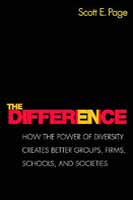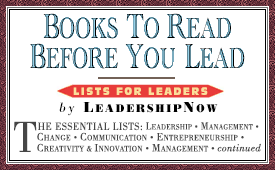
|
 |
The Difference: How the Power of Diversity Creates Better Groups, Firms, Schools, and Societies Scott E. Page 
Format: Paperback, 456pp. ISBN: 9780691138541 Publisher: Princeton University Press Pub. Date: August 11, 2008 Average Customer Review: For Bulk Orders Call: 626-441-2024 Description and Reviews From The Publisher: In this landmark book, Scott Page redefines the way we understand ourselves in relation to one another. The Difference is about how we think in groups--and how our collective wisdom exceeds the sum of its parts. Why can teams of people find better solutions than brilliant individuals working alone? And why are the best group decisions and predictions those that draw upon the very qualities that make each of us unique? The answers lie in diversity--not what we look like outside, but what we look like within, our distinct tools and abilities. The Difference reveals that progress and innovation may depend less on lone thinkers with enormous IQs than on diverse people working together and capitalizing on their individuality. Page shows how groups that display a range of perspectives outperform groups of like-minded experts. Diversity yields superior outcomes, and Page proves it using his own cutting-edge research. Moving beyond the politics that cloud standard debates about diversity, he explains why difference beats out homogeneity, whether you're talking about citizens in a democracy or scientists in the laboratory. He examines practical ways to apply diversity's logic to a host of problems, and along the way offers fascinating and surprising examples, from the redesign of the Chicago "El" to the truth about where we store our ketchup. Page changes the way we understand diversity--how to harness its untapped potential, how to understand and avoid its traps, and how we can leverage our differences for the benefit of all. A Q&A with author Scott E. Page What are the wider implications of your book? America is a place that prizes ability. Diversity is seen as a second- or even third-order effect—multicolored sprinkles atop the cake if you will. My book shows in stark, clear logic that diversity produces benefits far greater than mere symbolism. In fact, collective diversity may contribute more to progress than individual ability. And yet, I think a lot of people don’t really believe deep down that diversity is beneficial, but they feel it’s the politically correct thing to say. This book shows that it’s logically correct as well. Where can your ideas be applied? My book has implications for how organizations and firms manage diverse workforces, whether they are diverse in identity or vocation. It should change how people think about hiring and admissions decisions. What is "The Difference" anyway? It was a great college band in Ann Arbor in the mid-1980s and a reason why I originally didn’t want to have it as the title of my book. Seriously though, the difference is the recognition that when we look at all the cool stuff around us—iPods, cedar-planked salmon, Lego, and the Clapper—we have to chalk up a big chunk of the credit to our differences. Diversity is the difference between us sitting around a fire talking about where to find the next deer and doctors keeping my father alive through open-heart surgery. The difference refers to the change in the bottom line: collective diversity produces benefits. How have the companies you consulted with responded to the need for diversity? Have they created any policies to harness this power? I’ve worked with both companies and universities (which maximize endowments rather than profits). Some have used the logic of the book to rethink hiring practices—to think in terms of toolboxes, not measuring sticks. Most have begun to use examples from the book in their training sessions. In particular, there is a game called “Sum to Fifteen,” developed by Herbert Simon, which demonstrates how diverse perspectives can simplify hard problems, which is too fun not to use. Reviews "Scott Page has brought to our attention a practically important proposition: diversity of viewpoints is of the greatest importance in solving the problems that face us individually and collectively. Diversity among a group of problem solvers is more important than individual excellence. Page's exposition remarkably combines lightness and breadth of knowledge with rigor and evidence." —Kenneth J. Arrow, Nobel Prize-winning economist "Scott Page knows more about diversity than anyone anywhere. In The Difference, he shows why diversity matters, how it leads to better outcomes, and most importantly why achieving the significant benefits of diversity requires thinking well beyond traditional categories such as race, gender, or ethnicity. Knowledge of this book should be a litmus test for educators and diversity trainers--if you haven't read it, you are just talking metaphor. Stop playing defense and start playing offense by buying this book." —Bill Miller, Chairman and Chief Investment Officer, Legg Mason Capital Management "Does diversity trump ability when it comes to problem solving? Scott Page shows that the answer is, at least sometimes, yes. You'd do better to add more diversity of perspectives to your problem-solving team than to increase the average ability of individual team members. Diversity in both experience and identity can spark a group's creativity. Page pursues the logic of diversity and shows why and when hiring people who differ can lead to a better bottom line." —Ian Ayres, coauthor of Why Not? How to Use Everyday Ingenuity to Solve Problems Big and Small "The book is brilliant. Page has a dazzling eclecticism." —Max Bazerman, Harvard Business School
Reader's Index Send us your favorite quotes or passages from this book. • "A preference for working with people who bring the same formal perspectives to bear on a problem leads to segregation by function in firms and by discipline in the academy. In each case, the tendency to interact only with people like us creates the same micro-level dynamic. Each culture in a society, each identity group in a city, each department in a university, and each functional area of a firm ends up building walls around itself. As these walls become higher, the members of each group—be they Evangelicals, African Americans, chemists, or accountants—find themselves inside silos of their own creation." Pg. 374 About the Author Scott E. Page is Professor of Complex Systems, Political Science, and Economics at the University of Michigan and an external faculty member at the Santa Fe Institute. He is the coauthor of Complex Adaptive Systems. Table of Contents
Find Items On Similar Subjects |
|

The Essential Lists BOOKS TO READ BEFORE YOU LEAD 
Grow Your Leadership Skills NEW AND UPCOMING LEADERSHIP BOOKS 
Classic Leadership Books BOOKS TO READ BEFORE YOU LEAD |
 |
| ||
 | © 2020 LeadershipNow™ All materials contained in https://www.LeadershipNow.com are protected by copyright and trademark laws and may not be used for any purpose whatsoever other than private, non-commercial viewing purposes. Derivative works and other unauthorized copying or use of stills, video footage, text or graphics is expressly prohibited. |
||